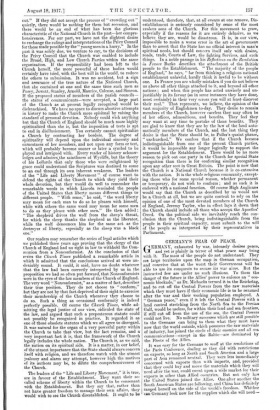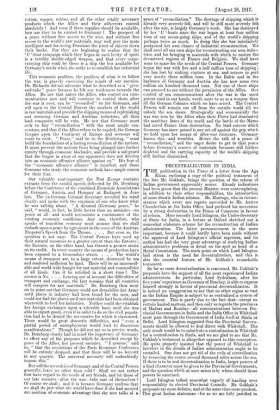GERMANY'S FEAR OF PEACE.
GERMANY, exhausted by war, intensely desires peace, and yet is plainly in terror of what peace may bring with it. The mass of the people do not understand. They see large territories upon the map in German occupation, and conceive that at the worst their Government will be able to use its conquests to secure its war aims. But the instructed few are under no such illusions. To them the danger of the future is the Allies' power to enforce an " eco- nomic blockade," an Dr. Michaelis termed it in the Reichstag, and to cut off the Central Powers from the raw materials which they must have if their economic life is to be resumed after the war and their working population employed. A " German peace," even if it left the Central Powers' with a land control stretching from the North Sea to the Persian Gulf, would be useless, for within their land and sea frontiers, if still cut off from the use of the sea, the Central Powers could not live. No military successes which are still possible to the Germans can bring to them what they must have now that the world outside, which possesses the raw materials of industry, has joined the circle of their enemies and all sea communications—except in the Baltic—are dominated by the Fleets of the Allies.
It was easy for the Germans to scoff at the resolutions of the Paris Conference, dealing as they did with restrictions on exports, so long as North and South America and a large part of Asia remained neutral. They were less immediately concerned with exports than with imports, and, provided that they could buy and move the materials which they will need after the war, could count upon a wide market for their exports in other than Allied countries. But not only has the United States joined the Allies. One after another the South American States are following, and China has definitely ranged herself on the side of the world's freedom. Whither can Germany look now for the supplies which she will need-
Cotton, copper, rubber, and all the other vitally necessary products which the Allies and their adherents control absolutely And even if these supplies should be available, how are they to be carried to Germany ? The prospect of a peace without free access to the seas, and without free access to the world's raw materials, may well give the more intelligent and far-seeing Prussians the iciest of shivers down their backs. For they are beginning to realize that the U '-boat campaign which they began in such levity of spirit is a terribly double-edged weapon, and that every cargo- carrying ship sunk by them is a ship the less available for Germany's needs when she seeks to re-establish her industrial life.
This economic problem, the problem of what is to follow the war, is gravely exercising the minds of our enemies. Dr. Michaelis did not advocate what he described as a " give- and-take " peace because he felt any tenderness towards the Allies, He saw that unless the Allies, who control sea com- munications now and will continue to control them after • the war is over, can be "reconciled" to the Germans, and will open to the Central Powers the markets of the world in raw materials and provide the shipping means of replenishing and restoring German and Austrian industries, all their land conquests will be vain. He saw that Germany must seek to buy " reconciliation " with the most ample con- cessions, and that if the Allies refuse to be cajoled, the German Empire upon the Continent of Europe and overseas will cease to exist. " Peace," said he to the Reichstag, " must build the foundations of a lasting reconciliation of the nations. It must prevent the nations from being plunged into further enmity through economic blockades, and provide a safeguard that the league in arms of our opponents does not develop into an economic offensive alliance against us." His fear of the " economic offensive alliance " is manifest, and those Germans who study the economic outlook have ample reason for their fear.
Our valuable contemporary the New Europe contains extracts from the candid speech delivered by Dr. Dernburg before the Conference of the combined Economic Associations of Germany, Austria, and Hungary at Budapest in June last. The ex-German Colonial Secretary revealed his mind clearly, and spoke with the emphasis of one who knew what he was talking about. "A dictated (German) peace," he said, " would, in fact, be little better than an armistice—no peace at all—and would necessitate a continuance of the existing economic conditions. Any one, therefore, who speaks of transition economy must assume that we shall embark upon a peace by agreement in the sense of the Austrian Emperor's Speech from the Throne. . . . But even so, the question is not easy. The Central Powers have used up their natural resources to a greater extent than the Entente ; the Entente, on the other hand, has thrown a greater strain on its credit. In every country the means of production have been exposed to a tremendous strain. . . . The world's means of transport are, to a large extent, destroyed by sea and rendered inefficient by land. There will be an immeasui- able and world-wide hunger for raw material and commodities of all kinds. Can it be satisfied in a short time ? The answer is No. . . . Leavirng out of account the difficulties of transport and exchange, the fact remains that all countries will compete for raw materials." Dr. Dernburg then went on to point. out that Germany could not demobilize her Army until places in industry had been found for the men, and could not find the places until raw materials had been obtained wherewith to feed her industries. Neither could she establish her foreign exchanges upon a tolerable basis until she was able to export goods, even if in order to do so the civil popula- tion had to be denied the necessaries for which it clamoured. There would be great domestic difficulties, and " even a partial period of unemployment would lead to disastrous manifestations." Though he did not say so in precise words, Dr. Dernburg clearly had in mind the impotence of Germany to effect any of the purposes which he described except by grace of the Allies, her present enemies. " I assume," said he, " that the resolutions of the Paris Economic Conference will be entirely dropped, and that there will be no boycott in any quarter. The universal necessity will undoubiedly impose this."
But will the necessities of Germany, and of the Central Powers generally, leave us other than cold ? Shall we not rather first have regard to the needs of our friends, and let those of our late enemies—after the war—take care of themselves ? Of course we shall and it is because Germany realizes that we shall do just what she would have done if she had secured our position of economic advantage that she now talks of a peace of " reconciliation." The shortage of shipping, which is already very severely felt, and will be still more severely felt after the war, is largely Germany's work. She has destroyed by her ' U '-boats since the war began at least four million tons of out ocean-going ships, and of the world's shipping perhaps twice as much. In doing this she has indefinitely postponed her own chance of industrial reconstruction. We shall need all our own ships for reconstructing our own indus- tries, and for bringing in materials with which to restore the devastated regions of France and Belgium. We shall have none to spare for the needs of the Central Powers. Germany began the war with five and a half million tons of shipping ; she has lost by sinking, capture at sea, and seizure in port very nearly three million tons. In the Baltic and in the harbours of Germany and Austria she has now some two million six hundred thousand tons. Not one of those ships can proceed to sea without the permission of the Allies. Our control of sea communications after the war is the most potent card in our hands, worth more to us as a weapon than all the German Colonies which we have seized. The Central Powers will remain cut off from the outside world till we unlock the sea doors. Strategically and economically the war was won by the Allies when their Fleets had dominated the maritime lanes of the world and the battle of the Marne had saved France from destruction. No land success which Germany has since gained is any set-off against the grip which we hold upon her means of after-war existence. Germany knows this—and trembles. Hence the talk of a peace of " reconciliation," and the eager desire to get to that peace before Germany's reserve of materials becomes still further depleted and the carrying capacity of the world's shipping still further diminished.



























 Previous page
Previous page